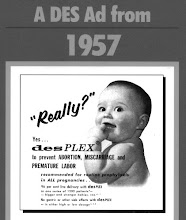A 9-year comprehensive study by French researcher, Marie-Odile Soyer-Gobillard has revealed a link between DES and mental health issues in DES daughters and DES sons. The study involved the hormones DES, 17-alpha-ethinylestradiol (synthetic EE) and synthetic progestin. A report in 2011 stated DES was often in a cocktail with EE and progestin.
Gobillard's study is not epidemiological, but rather provides a database for further research. It is interesting to note that in three previous epidemiological studies about the link between DES and psychiatric disorders, two favour the hypothesis of a causal link and one reaches a different conclusion.
Psychiatric disorders found by the Gobillard study were: Alcohol addiction, learning disorders, eating disorders, behavioral disorders (aggressiveness, impulsivity), sleep disorders, anxiety disorders, mood swings, major depressive episodes, bipolar disorders, personality disorders, schizophrenia, acute psychotic episodes, series of suicide attempts, and suicides. Across all synthetic oestrogens, girls were observed to be more vulnerable than boys for both somatic and psychiatric disorders.
In figures as of April 2012, Gobillard has revealed some disturbing statistics involving the mental health of 1676 DES daughters and DES sons. Of those exposed to DES in the womb, 1334 had reported psychiatric disorders. Of these Gobillard identified 128 attempted suicides and 48 suicides.
The above findings give rise to questions among DES Action groups. A link of this kind would easily go unnoticed, since previous emphasis has been on physical effects. Additionally there would be stigma felt by people experiencing psychological disorders, enough to dissuade their reporting these conditions to Action groups.
Links for more information:
Behavioral and somatic Disorders in Children Exposed in Utero to Synthetic Hormones, by #Hhorages
Behavioral and Somatic Disorders in Children Exposed in Utero to Synthetic Hormones: A Testimony-Case Study in a French Family Troop
by Marie-Odile Soyer-Gobillard, Charles Sultan (2012), Dr. Sameh Magdeldin (Ed.), ISBN: 978-953-51-0772-9, InTech, DOI: 10.57772/48637.
http://www.intechopen.com/books/state-of-the-art-of-therapeutic-endocrinology/behavioral-and-somatic-disorders-in-children-exposed-in-utero-to-synthetic-hormones-a-testimony-case
14th October 2013
Anti-Miscarriage drug linked to mental health problems
A recent French study has linked the anti-miscarriage drug, diethylstilboestrol (DES) with psychiatric disorders in the children exposed to the drug in the womb. Researcher, Marie-Odile Soyer-Gobillard, has revealed serious psychological side effects in "DES daughters" and "DES sons", with a worryingly high incidence of attempted suicide and suicide
.
An estimated 740,000
Australians have been affected by DES, which was
prescribed to pregnant women between 1940 and 1971 (and sometimes beyond). DES causes reproductive problems and an increased risk of certain cancers (breast, cervical and vaginal) in those women given DES and their children of that pregnancy.
In a familial case control study by Soyer-Gobillard, a range of psychological disorders are reported across exposed and non-exposed groups, which include eating disorders, sleeping disorders, anxiety disorders, major depression, bipolar disorders and schizophrenia. Out of 1676 DES daughters and DES sons, 1334 reported psychiatric disorders, with 128 attempted suicides and 48 suicides. In terms of both psychological and somatic disorders, DES daughters suffered more than DES sons.
"These disturbing study results have opened up a whole new area of concern to us," says Carol Devine, coordinator of DES Action NSW. "Emphasis has always been on physical effects of DES exposure, and then coupled with the stigma felt by people in mentioning mental health problems, it is no wonder this link has gone unnoticed," adds Devine.
Over 10 million people were exposed to DES worldwide and many people remain unaware of their exposure to DES and the potential adverse health effects of DES. People exposed require vital special health care. In Australia there has been no promotion of DES information in public health programs due to concern this may create community anxiety. People can find out about DES at www.desnsw.blogspot.com or by phoning DES Action NSW 02 98754820.
HEALTH CHECK LIST: If you tick 'yes' to any of the following, ask your doctor about possible exposure to DES:
- Does your mother recall having previous miscarriages or being prescribed medications while pregnant? DES was most commonly prescribed to prevent miscarriage and for pregnancy complications such as bleeding. It was also known as "stilboestrol".
- If unable to ask your mother, does your health history show a series of reproductive problems such as cancer, difficulty in getting pregnant or carrying a pregnancy to term or near term, ectopic (tubal) pregnancy, miscarriages or premature deliveries?
- Does your mother remember only being given "hormones" during pregnancy? It is worthwhile having a check-up, informing the doctor your mother was given hormones during pregnancy. Progesterone, another hormone, may have also been used to prevent miscarriage and research has shown no problems with this.
-ENDS-
Information sources:
http://www.intechopen.com/books/state-of-the-art-of-therapeutic-endocrinology/behavioral-and-somatic-disorders-in-children-exposed-in-utero-to-synthetic-hormones-a-testimony-case
http://www.cancercouncil.com.au/880/news-media/get-the-facts/cancer-prevention-get-the-facts/cancer-council-new-south-wales-diethylstilbestrol-des-and-cancer/
For more information or interviews, contact:
Carol Devine
E: c_devine@bigpond.net.au
P: (02) 98754820











